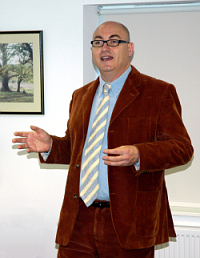 A special lecture was delivered at Ashurst Lodge on the Kyoto Protocol and regional issues; the case of La Marche region in Italy. The talk was given by Professor Giorgio Passerini of the Politecnic University of La Marche.
A special lecture was delivered at Ashurst Lodge on the Kyoto Protocol and regional issues; the case of La Marche region in Italy. The talk was given by Professor Giorgio Passerini of the Politecnic University of La Marche.
Professor Passerini has visited WIT on different occasions and collaborated with the Institute in a series of important initiatives, including the publication of books with WIT Press and the organisation of several international conferences. The collaboration originated many years ago and continues to produce outstanding scientific results. Giorgio is now an Adjunct Professor at the Wessex Institute.
In his talk, Giorgio referred to the importance of understanding the Global Warming potential of different types of air contaminants, some of which can be potentially more dangerous than the well reported CO2.
Greenhouse emissions arise in the case of CO2 from stacks, exhaust pipes, etc; while fugitive emissions are mainly methane (CH4); and diffuse emissions are from landfills and others (NO2, CH4, CO2).
Emissions are principally from the energy industry, primarily electricity; non-industrial combustion plants such as those producing heat and road transport.
Nearly all Methane (CH4) comes from waste management disposal and from cattle.
When one sees the overall figures, it is significant that in terms of CO2, liquified gas is much cleaner than coal. The difference is nearly one half in terms of emissions and points out the need to stop using coal.
Cattle breeding produces a considerable amount of gas.
Emissions due to electricity production and transport have increased by more than one third in La Marche within 10 years in spite of using better technologies.
The question is how the region (as well as others) can meet the Kyoto agreement targets. There are a few important areas to consider:
- Energy production
- Road transport
- Waste management
- Agriculture and cattle breeding
The lecture was followed by a lively discussion in which issues related to the application of the protocol in other regions of the world, particularly developing countries, were discussed.

 Wessex Institute
Wessex Institute